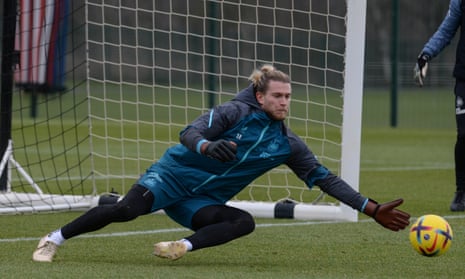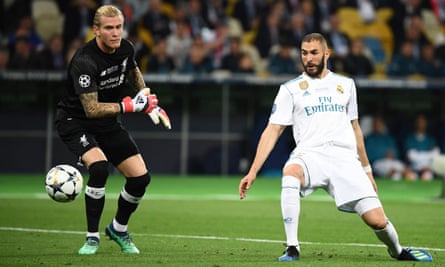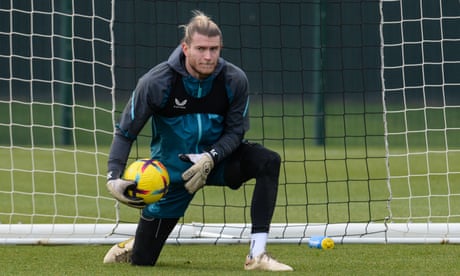Loris Karius knows only too well how one game can change a career

After a Champions League final sent his trajectory off course, the goalkeeper gets an unlikely shot at glory with Newcastle
An armchair diagnosis, for sure, but one that intrigued Klopp enough to make further inquiries. The next day Karius was flown to Boston where he had rigorous tests at the Spaulding Rehabilitation hospital. The concussion assessment consists of a checklist of 30 symptoms, including headache, light sensitivity, loss of memory and nausea. Five days after the biggest game of his life, Karius still had 26 of the 30 clinical signs of concussion.
The fateful events of Kyiv – in which Karius rolled the ball into Karim Benzema’s foot, before spilling Gareth Bale’s shot into his own net – would shape and scar the goalkeeper for years. He received death threats. He was heckled by opposition players. After leaving Liverpool he went on a carousel of unsatisfactory moves, first to Besiktas then to Union Berlin and finally to unemployment. And the game that set this entire doleful spiral in motion was played under the cloud of a severe head trauma.
The Carabao Cup final on Sunday offers Karius the opportunity of a remarkable comeback. It is Newcastle’s first cup final in 24 years, and with Nick Pope suspended and Martin Dubravka cup-tied, their hopes rest on their third-choice goalkeeper, hastily signed on a free in the summer and almost released in January. It may well be the only game Karius plays for the club. And yet he knows, perhaps as well as anybody in the sport, the potential for one game to change the trajectory of a career for ever.
Karius returned to Liverpool for pre-season in the summer of 2018 determined to reset his career and start afresh. Klopp, too, was minded to give him another chance. And yet a string of errors in friendlies were evidence of a mind still distracted, confidence still shattered. Karius had always been an aggressive risk-taking goalkeeper, and a certain quantum of error had been built into his game. But with Liverpool building towards a title challenge, an upgrade was patently required. Alisson arrived from Roma that summer and the club has not looked back.
So Karius went to Besiktas, where after a decent start the errors began to creep in again. “Something is wrong with his electricity, motivation, enthusiasm,” manager Senol Gunes said. “It has been like that since the beginning.” Against Slovan Bratislava in a Europa League game in late 2019, he charged out of his penalty area to try to head away a long ball, and misjudged it completely. After pursuing the club over alleged unpaid wages, he left during the pandemic.

The move to Berlin proved similarly fruitless. Signed to compete for the No 1 jersey with the veteran Andreas Luthe, Karius found his game time limited, and afterwards would rage at his treatment by coach Urs Fischer. “In retrospect, I would not make the move to Union now,” he said later. “I was assured that I would be in goal and would get playing time straight away. Unfortunately, that didn’t happen. I never had a fair chance to excel there.”
Union, for their part, paint a slightly different picture. They insist that no guarantees were made to Karius, and that with Luthe performing strongly there was simply never sufficient justification to make a change. And while Karius’s professionalism was never in question, there is a lingering suspicion that he never quite fitted into the unstarry, workmanlike ethos of the club. His profile and his celebrity girlfriend made him a staple of the gossip columns, a fact that Karius later admitted as a source of regret. Above all it was simply a move that never really made much sense.
And if there is a lesson in the tale of Karius it is that the factors that determine the course of a career are never solely based on performance. This is doubly true in the case of goalkeepers, where opportunities are slight, the stakes are invariably astronomical and the role itself is in part an act of faith: not only a faith in one’s own ability but the ability to transmit it to others.
Had Karius played a Champions League final a few years later, under current concussion protocols, he might never have been on the pitch to make those errors. Had he played a few years earlier he might have been spared the brutal judgment of a thousand internet meme artists and been allowed to grieve in peace. His most serious failing, if you can call it that, was one of timing.
Nobody really knows how Karius will fare on Sunday. He has not played a senior professional game for two years. Nobody knows where his head is at, what battle scars still remain, how he will fare in the cauldron of a cup final with Marcus Rashford bearing down on his goal. The redemption arc is a seductive narrative, and many neutrals will wish him well. But this is a brutal profession and the margins are often hair-thin. And so it is probably fair to say that for Karius, the moment of greatest opportunity also presents the moment of greatest risk.

Comments
Post a Comment